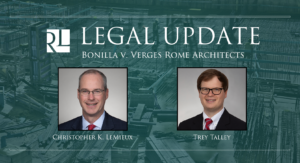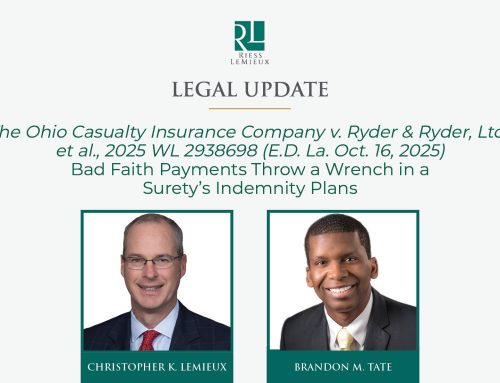 Bonilla v. Verges Rome Architects, 2024 WL 1229219, 2023-00928 (La. 3/22/24)
Bonilla v. Verges Rome Architects, 2024 WL 1229219, 2023-00928 (La. 3/22/24)
Authors: Christopher K. LeMieux and Trey Talley
LASC rules that design professionals do not necessarily owe an all-encompassing safety duty on projects.
The Louisiana Supreme Court recently held that design professionals on a construction project do not owe an all-encompassing duty to protect everyone from every risk which could be encountered during the course of a construction project. Instead, the duty is confined to the specific language of the contract and the risks encompassed therein.
Bonilla v. Verges Rome Architects arises out of a personal injury case on a construction project. The plaintiff was an employee of the demolition subcontractor, Meza Services, Inc. While performing demolition work, the employee sustained substantial personal injuries. The employee filed suit against Verges Rome Architects (“VRA”), the architect on the project, and Morphy Makofsky, Inc. (“MMI”), VRA’s engineering consultant, alleging negligence in the preparation and approval of the plans and specifications, failure to properly design or support the area being demolished, and failure to monitor and supervise the execution of the plans to ensure safety at the job site.
VRA moved for summary judgment asserting that it did not owe a duty to oversee, supervise, or maintain the construction site or to the plaintiff employee’s safety. The trial court granted the summary judgment in favor of VRA, but the Fourth Circuit Court of Appeal reversed. On review, the Louisiana Supreme Court’s focus centered on whether VRA owed a duty to the plaintiff. Ultimately, the Louisiana Supreme Court concluded that no duty was owed.
In its analysis, the Louisiana Supreme Court looked at the specific language of the contract between VRA and the owner to determine whether or not a duty was owed. The Court concluded that although the contract required VRA to make weekly site visits, the purpose of the site visits was to ensure that the progress and quality of work was proceeding according to the specifications – not to ensure work site safety. Moreover, the contract specifically stated that VRA had no control over the construction means, methods, techniques, sequences or procedures, or safety. In reading all of the contractual provisions together as a whole, the Court held that no duty was owed by VRA to the plaintiff to oversee the safety of the construction workers.
Importantly, the Court held that “the mere fact that an engineer or architect was involved in the construction process and had contractual duties to an owner does not create an all-encompassing duty to protect everyone from every risk which could be encountered during the course of the project.”
This ruling is critical, as it clarifies that in Louisiana, engineers and architects do not automatically owe a duty to any third party involved on the project for any potential risk. Curiously, this decision is arguably at odds with the general duties owed by architects and engineers for the health, safety, and welfare of the public. Nevertheless, the determination of whether a specific duty is owed hinges on the language of the design professional’s contract and scope of work, and the design professional owes no duty for items of risk that are excluded from the contract.



